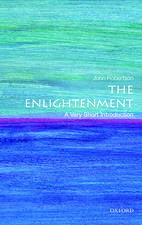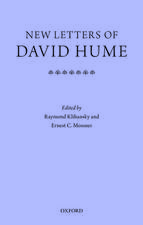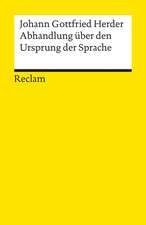John Locke and Natural Philosophy
Autor Peter R. Ansteyen Limba Engleză Paperback – 4 apr 2013
| Toate formatele și edițiile | Preț | Express |
|---|---|---|
| Paperback (1) | 273.14 lei 31-37 zile | |
| OUP OXFORD – 4 apr 2013 | 273.14 lei 31-37 zile | |
| Hardback (1) | 499.07 lei 31-37 zile | |
| OUP OXFORD – 31 mar 2011 | 499.07 lei 31-37 zile |
Preț: 273.14 lei
Preț vechi: 303.20 lei
-10% Nou
Puncte Express: 410
Preț estimativ în valută:
52.27€ • 54.37$ • 43.15£
52.27€ • 54.37$ • 43.15£
Carte tipărită la comandă
Livrare economică 03-09 aprilie
Preluare comenzi: 021 569.72.76
Specificații
ISBN-13: 9780199679522
ISBN-10: 0199679525
Pagini: 272
Dimensiuni: 157 x 235 x 15 mm
Greutate: 0.41 kg
Editura: OUP OXFORD
Colecția OUP Oxford
Locul publicării:Oxford, United Kingdom
ISBN-10: 0199679525
Pagini: 272
Dimensiuni: 157 x 235 x 15 mm
Greutate: 0.41 kg
Editura: OUP OXFORD
Colecția OUP Oxford
Locul publicării:Oxford, United Kingdom
Recenzii
Anstey argues that Lockes views on natural philosophy have been poorly understood, that the distinction between natural and speculative philosophy is central to understanding Lockes project, and that laws of nature play only a small role in his theory . . . This excellent book is crucial reading for anyone interested in the development of the scientific method.
an excellent book on Locke and natural philosophy. [Anstey] integrates deep archival research and a broad knowledge of the time and place with good judgment and sharp insight. His accounts of Locke's relations to Bacon and Boyle, of Locke's interests in biology, medicine, and chemistry, and of Locke's views on natural history and hypotheses are the fullest and best that I know.
It will be an uncommon philosopher who has nothing to learn from this masterly reappraisal of Locke's positions in natural philosophy and the philosophy of science ... The wealth of material he presents enables Anstey to build a convincing portrait in depth, all the more convincing because the figure that emerges, complex, multi-talented, and at the centre of things, enables us to understand Locke's standing among his contemporaries, even those for whom philosophy as we know it ranked low among their preoccupations ... a mighty achievement.
Every reader of Peter Anstey's John Locke and Natural Philosophy will be struck by how much the author knows about Locke's engagement with natural philosophy.
Locke's work on natural philosophy has been the subject of an increasing amount of attention in recent years, but [this] is the first book to have been devoted entirely to this area of his thought. . . . As this book amply demonstrates, Peter Anstey has a first-rate command of this material . . . The term "Locke scholar" has often been used for writers in whom few traces of scholarship are discernible, but in Anstey's case the term is, for once, entirely appropriate . . . John Locke and Natural Philosophy is an important contribution to Locke studies, and one that ought to be read by anyone with a serious interest in Locke's thought. Many books on Locke can safely be neglected: this is emphatically not one of them.
an excellent book on Locke and natural philosophy. [Anstey] integrates deep archival research and a broad knowledge of the time and place with good judgment and sharp insight. His accounts of Locke's relations to Bacon and Boyle, of Locke's interests in biology, medicine, and chemistry, and of Locke's views on natural history and hypotheses are the fullest and best that I know.
It will be an uncommon philosopher who has nothing to learn from this masterly reappraisal of Locke's positions in natural philosophy and the philosophy of science ... The wealth of material he presents enables Anstey to build a convincing portrait in depth, all the more convincing because the figure that emerges, complex, multi-talented, and at the centre of things, enables us to understand Locke's standing among his contemporaries, even those for whom philosophy as we know it ranked low among their preoccupations ... a mighty achievement.
Every reader of Peter Anstey's John Locke and Natural Philosophy will be struck by how much the author knows about Locke's engagement with natural philosophy.
Locke's work on natural philosophy has been the subject of an increasing amount of attention in recent years, but [this] is the first book to have been devoted entirely to this area of his thought. . . . As this book amply demonstrates, Peter Anstey has a first-rate command of this material . . . The term "Locke scholar" has often been used for writers in whom few traces of scholarship are discernible, but in Anstey's case the term is, for once, entirely appropriate . . . John Locke and Natural Philosophy is an important contribution to Locke studies, and one that ought to be read by anyone with a serious interest in Locke's thought. Many books on Locke can safely be neglected: this is emphatically not one of them.
Notă biografică
Peter R. Anstey studied analytic philosophy and the history of philosophy at the University of Sydney. He later took up a U2000 postdoctoral fellowship at Sydney and then a lectureship. In 2006 he moved to Dunedin in New Zealand where he is the inaugural Professor of Early Modern Philosophy in the Department of Philosophy at the University of Otago. His research focuses on early modern philosophy with special reference to the writings of John Locke and Robert Boyle. He is the author of The Philosophy of Robert Boyle (Routledge, 2000).















